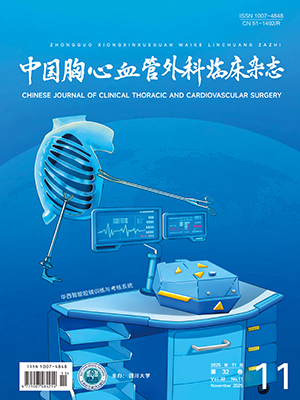| 1. |
Park CS, Lee JR, Lim HG, et al. The long-term result of total repair for tetralogy of Fallot. Eur J Cardiothorac Surg, 2010, 38(3): 311-317.
|
| 2. |
Frigiola A, Redington AN, Cullen S, et al. Pulmonary regurgitation is an important determinant of right ventricular contractile dysfunction in patients with surgically repaired tetralogy of Fallot. Circulation, 2004, 110(11 Suppl 1): Ⅱ153-Ⅱ157.
|
| 3. |
Mikhail A, Labbio GD, Darwish A, et al. How pulmonary valve regurgitation after tetralogy of Fallot repair changes the flow dynamics in the right ventricle: An in vitro study. Med Eng Phys, 2020, 83: 48-55.
|
| 4. |
Shahanavaz S, Qureshi AM, Levi DS, et al. Transcatheter pulmonary valve replacement with the melody valve in small diameter expandable right ventricular outflow tract conduits. JACC Cardiovasc Interv, 2018, 11(6): 554-564.
|
| 5. |
Alkashkari W, Alsubei A, Hijazi ZM. Transcatheter pulmonary valve replacement: Current state of art. Curr Cardiol Rep, 2018, 20(4): 27.
|
| 6. |
Kenny D, Hijazi ZM, Kar S, et al. Percutaneous implantation of the Edwards SAPIEN transcatheter heart valve for conduit failure in the pulmonary position: Early phase 1 results from an international multicenter clinical trial. J Am Coll Cardiol, 2011, 58(21): 2248-2256.
|
| 7. |
Martin MH, Meadows J, McElhinney DB, et al. Safety and feasibility of melody transcatheter pulmonary valve replacement in the native right ventricular outflow tract: A multicenter pediatric heart network scholar study. JACC Cardiovasc Interv, 2018, 11(16): 1642-1650.
|
| 8. |
Lurz P, Kister T. Why we need another percutaneous pulmonary valve: If size matters. EuroIntervention, 2019, 14(13): 1347-1349.
|
| 9. |
Jones TK, McElhinney DB, Vincent JA, et al. Long-term outcomes after melody transcatheter pulmonary valve replacement in the US investigational device exemption trial. Circ Cardiovasc Interv, 2022, 15(1): e010852.
|
| 10. |
Kenny D, Rhodes JF, Fleming GA, et al. 3-year outcomes of the Edwards SAPIEN transcatheter heart valve for conduit failure in the pulmonary position from the COMPASSION multicenter clinical trial. JACC Cardiovasc Interv, 2018, 11(19): 1920-1929.
|
| 11. |
Hribernik I, Thomson J, Ho A, et al. Comparative analysis of surgical and percutaneous pulmonary valve implants over a 20-year period. Eur J Cardiothorac Surg, 2022, 61(3): 572-579.
|
| 12. |
Zahn EM, Hellenbrand WE, Lock JE, et al. Implantation of the melody transcatheter pulmonary valve in patients with a dysfunctional right ventricular outflow tract conduit early results from the US clinical trial. J Am Coll Cardiol, 2009, 54(18): 1722-1729.
|
| 13. |
Zhou D, Pan W, Jilaihawi H, et al. A self-expanding percutaneous valve for patients with pulmonary regurgitation and an enlarged native right ventricular outflow tract: One-year results. EuroIntervention, 2019, 14(13): 1371-1377.
|
| 14. |
Shang X, Dong N, Zhang C, et al. The clinical trial outcomes of Med-Zenith PT-Valve in the treatment of patients with severe pulmonary regurgitation. Front Cardiovasc Med, 2022, 9: 887886.
|
| 15. |
Morgan G, Prachasilchai P, Promphan W, et al. Medium-term results of percutaneous pulmonary valve implantation using the Venus P-valve: International experience. EuroIntervention, 2019, 14(13): 1363-1370.
|
| 16. |
Virk SA, Liou K, Chandrakumar D, et al. Percutaneous pulmonary valve implantation: A systematic review of clinical outcomes. Int J Cardiol, 2015, 201: 487-489.
|
| 17. |
Morray BH, McElhinney DB, Cheatham JP, et al. Risk of coronary artery compression among patients referred for transcatheter pulmonary valve implantation: A multicenter experience. Circ Cardiovasc Interv, 2013, 6(5): 535-542.
|
| 18. |
Cardoso R, Ansari M, Garcia D, et al. Prestenting for prevention of melody valve stent fractures: A systematic review and meta-analysis. Catheter Cardiovasc Interv, 2016, 87(3): 534-539.
|
| 19. |
Lehner A, Haas NA, Dietl M, et al. The risk of infective endocarditis following interventional pulmonary valve implantation: A meta-analysis. J Cardiol, 2019, 74(3): 197-205.
|
| 20. |
Abdelghani M, Nassif M, Blom NA, et al. Infective endocarditis after melody valve implantation in the pulmonary position: A systematic review. J Am Heart Assoc, 2018, 7(13): e008163.
|
| 21. |
Jalal Z, Galmiche L, Beloin C, et al. Impact of percutaneous pulmonary valve implantation procedural steps on leaflets histology and mechanical behaviour: An in vitro study. Arch Cardiovasc Dis, 2016, 109(8-9): 465-475.
|




